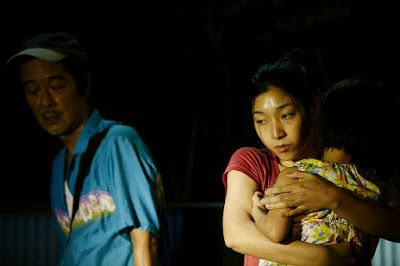So, after years of films put forward,
Kore-eda Hirozaku finally scooped the big prize at this year's Cannes festival,
claiming the Palme d'Or for his latest "Shoplifters". Coming a matter
of months after the multiple successes of "The Third Murder" at the domestic
Academy awards in Japan, he is adding medals to years of critical acclaim. But
how does his most prized film sit among the rest of an oeuvre in which a bad film
has yet to materialise?
Well, as if a "Nobody Knows" of
adults, "Shoplifters" shows a "family" of acquaintances,
brought together by a similar social status and treatment by their more
traditional families. "Grandmother" Hatsue (the late Kirin
Kiki), oversees her "son" Osamu (Lily Franky), his younger "wife"
Nobuyo (Sakura Ando), her "sister" Aki (Mayu Matsuoka) and the
couple's "son" Shota (Jyo Kairi).
After a session of successful five-finger
discount, Osamu and Shota walk home passed the again-left-out-in-the-cold Yuri
(Miyu Sasaki). Offering her food and warmth, they soon realise they will need
to return her to her rightful home. But as they are about to do so, her
parents' arguing can be heard, and Nobuyo can't bring herself to leave her in
an unloving household. The couple, therefore, have just given birth to their
second child and latest family member.
But what they can offer in a loving home
cannot be matched financially. They all live in a one room shack, sleeping on
top of each other. Osamu has a low-paying job in construction, but soon finds
himself injured and out of work. Nobuyo works in a laundry service, but finds herself in the same scenario. Aki is the only real earner, but working in
a peep show flaunting her bits, and as such does not share her keep with the
others. The family's main livelihood, therefore, comes from Hatsue's pension
and low-level thievery. Osamu and Shota are the main protagonists in this line
of work, and Yuri is brought in on their game.
But a financial and family structure such
as this can only stay stable for so long. Caught in the act, an accident
during escape sees a hospitalisation, leading to arrests, prompting
confessions, resulting in the end.
Kore-eda always poses a question in his
films, to which there is no immediate answer. Here it is as to the bind that
keeps families together. While they have no blood ties, in "taking
in" Yuri, they treat her better than her parents ever will, with more love
and dedication. They have little to offer any new family members, but all seem
happy with the situation, despite all having lives that one would seek to
avoid. This is closer than the relations the depicted blood relatives offer
each other.
The "Shibatas" are together by
choice rather than forcibly by blood, with their post-modern solution a
seemingly better option against tradition. But blood ties will always be there, and
the choice to walk away from the Shibatas is also true. On arriving, Yuri is
given the option to stay or return to her family; and once the authorities
become involved, there are perhaps deceptions in all of them.
Shota gets caught on purpose, knowing it
could result in their demise; Osamu and Nobuyo's killing in self-defence of her
ex-husband is revealed; Hatsue and Aki have former family connections, Hatsue
claiming money off Aki's parents on the sly; and with Shota lying in hospital
ready for questioning, the others plot their escape, leaving him alone. The
"family" is perhaps no more than a convenience for the criminal, low paid and
deceiving, with little actually known as to those they share a floor with. But
once legally put to rights, all show that the artificial family they'd created
was perhaps preferable to the alternative. With no blood ties, they had to be
more careful and considered in their behaviour to each other and what is said
and revealed, leaving a happier compromise.
As ever, Kore-eda's slow pacing allows
for a succession of detailed and delicate shots to build the story, as well as
your knowledge of Lily Franky's buttocks. The end, however, is a confessional,
each revealing their story to the police in individual interviews (partly
conducted by Kengo "...Yonosuke" Kora). Though these are not designed
to pull too tightly on the heart strings. As with "Nobody Knows", the
everyday nature of the reactions, again perhaps a nod to the reaction and
treatment of the lower classes and underclass in modern society: unseen and
treated with indifference.
Their family unit is not allowed to
survive in the legal system; the poor and destitute barely able to survive
under it also. And following on from "The Third Murder", Kore-eda
again questions the nature of justice: The Shibata's "kidnap" Yuri,
but treat her better than her parents ever would, though they are the convenient
scapegoat.
Featuring good performances throughout
from some old reliables as well as some new names, there is undoubtedly a lot
of expectation sat on "Shoplifters". The truth is that it is not his
best film, but is definitely up there in a career of high standards,
though perhaps doesn't leave as much of an impression as some that have come before it. But in an era of dropping standards, this is certainly the best new film I have
seen this year, cementing that his is one of the best talents in contemporary
cinema and justifying those awards.










